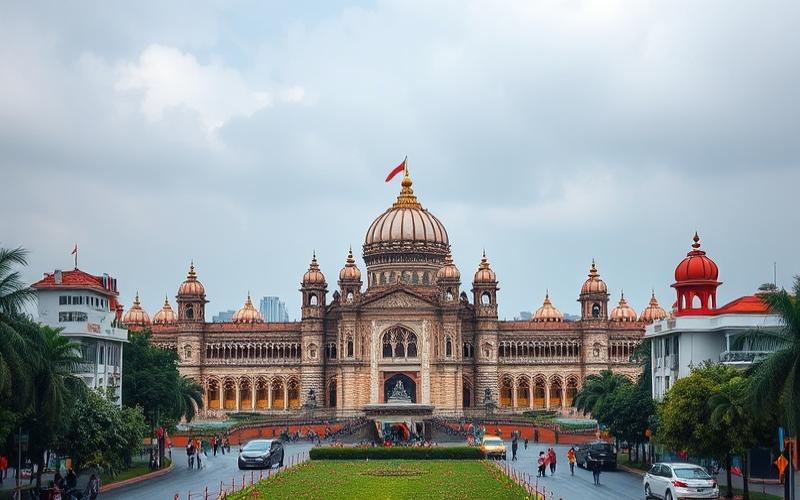
 Published on and written by Cyril Jarnias
Published on and written by Cyril Jarnias
India, with its vast territory and rich cultural mosaic, continues to fascinate and attract people from around the world. The year 2025 marks a crucial turning point in the field of foreign nationals’ law in this country, with new legislation profoundly influencing the status and rights of non-citizens.
These reforms respond to constantly evolving socio-economic and geopolitical dynamics and promise to reshape how India interacts with its foreign population.
By closely examining these developments, this article decodes the complexities of the current legislative framework and potential implications for foreigners residing in India, thereby shedding light on the future of Indian migration policy.
Latest Legislative Reforms on Immigration in India
Recent Legislative Reforms on Immigration in India (2023-2025)
Main Objectives of the Reforms:
- Modernization and unification of the legal framework: Adoption of the Immigration and Foreigners Bill, 2025, which replaces several colonial laws (Passport Act 1920, Registration of Foreigners Act 1939, Foreigners Act 1946, and Immigration Carriers’ Liability Act 2000).
- Strengthening regulation of migration flows: Introduction of centralized management by the National Immigration Authority (NIA) and creation of the Bureau of Immigration to oversee procedures.
- Improvement of visa application procedures: Implementation of an integrated digital system with biometric identification and artificial intelligence tools to facilitate border control and expedite checks.
- New visa classification:
- Business visa plus
- Startup visa
- Skilled talent visa
- Investor visa
- Transit visa & digital nomad visa
| Main Objective | Key Measure |
|---|---|
| Migration Regulation | Centralized NIA + Bureau of Immigration |
| Visa Procedures | New categories + full digitalization |
| Enhanced Control | Mandatory reporting by hotels, schools, hospitals |
| Fraud Prevention | Heavier penalties for fake documents |
Public and Parliamentary Debates:
Numerous debates have focused on the balance between national security and individual rights, especially after the bill shifted the burden of proving legal status to the individual rather than the state.
Increased restrictions on foreigners’ movements in certain sensitive areas, along with mandatory reporting by institutions, have sparked controversy among some lawmakers.
Several NGOs have denounced an increased risk of administrative arbitrariness and social exclusion.
Civil Society & Organization Reactions:
- Human rights advocates: Concerned about possible increased stigmatization of migrants.
- Professional organizations: Praise new “talent” visas as a positive factor for the Indian economy.
- International student associations: Concerns regarding mandatory reporting to universities.
Potential Impact on Foreigners Residing in India:
Expected effects according to official analyses
Simplification for entrepreneurs, investors, or skilled talents through an expedited process.
| Affected Group | Anticipated Impact |
|---|---|
| Entrepreneurs/startups | Easier access via new “Startup Visa” |
| Skilled workers | Dedicated visa for strategic sectors |
| Students/researchers | Enhanced administrative monitoring |
| Irregular migrants | Increased risk of detention/deportation |
Official Statements & Expert Analyses:
“This reform places India at the global forefront in economic attractiveness while ensuring our internal security.”
— Indian Home Minister
“The individual accountability required in this text potentially exposes certain vulnerable groups to disproportionate legal risk.”
— Professor S.K. Rao (International Law)
Possible Effects on International Relations:
- Strengthened border control viewed positively by some Asian partners concerned about regional security.
“The modernization of the Indian system could serve as a regional example but requires a balance between economic openness and respect for international humanitarian law.”
— UN Special Rapporteur on Migration
Experts warn, however, that these measures could temporarily complicate certain academic or humanitarian exchanges if implementation remains too rigid.
Good to Know:
The immigration legislative reforms adopted in India between 2023 and 2025 primarily aim to regulate migration flows by simplifying visa application procedures and strengthening asylum policy to better integrate refugees. These reforms have triggered intense debates within the Indian Parliament and elicited strong reactions from civil society, particularly migrant rights organizations that have expressed concerns about potential increased restrictions. The Indian government, through several ministers, has defended the necessity of these changes to adapt to contemporary migration dynamics and secure national interests. According to experts, while these measures could improve administrative efficiency, they risk negatively impacting India’s international perception in terms of human rights, while creating challenges for already resident foreigners, forcing some to reassess their legal status and future in the country.
Impact of New Laws on Expatriates in 2025
Detailed Analysis of Key New Laws Adopted in India in 2025 Affecting Expatriates
In 2025, India profoundly reformed its legal framework governing the presence of foreigners with the adoption of the Immigration and Foreigners Act 2025 and updates to passport-related rules. These measures directly impact expatriates regarding visa procedures, work permit criteria, and tax obligations.
| Area | Main Changes (2025) |
|---|---|
| Visa Procedures | – Enhanced requirements for all visa types (business, talent, investor…). – Expedited process for certain priority profiles (e.g., AI, biotechnologies). – Digitalized control by the National Immigration Authority. – Heavier sanctions: up to three years imprisonment or 300,000 INR fine for violations. |
| Work Permits | – Introduction of the Skilled Talent Visa reserved for strategic occupations. – Need for validation of professional or entrepreneurial project for the Startup Visa. – Required professional experience and enhanced qualification verification. |
| Tax Obligations | – Possible extension of reporting obligations for certain profiles; anticipated strengthening of automatic information sharing between Indian authorities and partner countries. – Not yet specified in the new law but strong anticipation of increased tax scrutiny on global income. |
Since February 24, 2025, the new generation of Indian passports includes a unique barcode linked to a centralized database to enhance administrative tracking and combat fraud.
Anticipated Economic and Social Impact
- For expatriates:
- Administrative complexity: New documentary requirements make spontaneous settlement more difficult.
- Concern about administrative arbitrariness: Expanded discretionary power given to immigration agents allows for indefinite detention without effective judicial oversight.
- Increased fear among vulnerable populations: Particularly low-skilled migrant workers exposed to rapid expulsion or disproportionate fines.
- On the Indian labor market:
- Enhanced selectivity: Focus on exclusively attracting highly skilled talents may reduce the total number of expatriates but increase their potential added value.
- Tension with some multinational companies: They already warn of a possible shortage in certain innovative sectors if the system is too inflexible.
Quotes & Official/Expert Reactions
“The National Immigration Authority aims to streamline but also better monitor all foreign presence. Zero tolerance towards any offense will now be enforced.”
— Arun Mehta, Official NIA Spokesperson
“The new regime provides too few procedural guarantees for foreigners against the massive discretionary power granted to administrative agents.”
— Pranay Gupta, International Law Specialist Attorney
“The prescribed penalties are such that they risk primarily deterring those without access to significant financial capital.”
— Representative, Human Rights Migrant Watch India
Identified Support & Resistance
- Strong Support:
- Indian government justifies these measures by “national security” and “selective attractiveness” towards strategic profiles.
- Some economic groups welcome a much-needed clarification in procedures long deemed opaque.
- Significant Resistance:
- Local/international NGOs openly denounce “a widespread anxiety-inducing climate” among foreign communities settled for several years.
- International professional associations warn of “a potential loss for the Indian entrepreneurial ecosystem.”
Visual Summary: Main Affected Categories
| Category | Main Impact |
|---|---|
| Skilled Workers | Facilitated access under strict conditions |
| Entrepreneurs | Mandatory validation of innovative project |
| Low-skilled Workers | Increased risk of exclusion/expulsion |
| Multinational Companies | Need for internal HR/tax adaptation |
Key Text:
The Immigration and Foreigners Act 2025 marks a restrictive turning point coupled with New Delhi’s stated intention to target only certain foreign profiles considered priorities—yet at the cost, according to several Indian legal experts, of “a notable weakening of fundamental rights attached to foreign residence.”
Good to Know:
In 2025, India adopted pivotal laws affecting expatriates, with notable revisions to visa procedures now requiring proof of secure employment before entry into the country. Criteria for obtaining work permits have become stricter, necessitating specific qualifications aligned with in-demand sectors such as information technology. Regarding taxation, expatriates must now fulfill rigorous reporting obligations, raising concerns about administrative complexity. According to Meera Sharma, an attorney specializing in international law, these laws aim to promote local employment but risk limiting the influx of foreign talent. Economic experts estimate that this legislation could have a mixed impact on the Indian labor market, reducing some foreign investments while stimulating local opportunities. Benson Thomas, spokesperson for the Indian Ministry of Home Affairs, defends these measures, stating they strengthen national security. However, foreign rights advocacy groups denounce these developments, fearing a reduction in international cultural and professional exchanges.
Analysis of Legal Issues for Foreigners in India
The major 2025 legislative reform in India, with the adoption of the Immigration and Foreigners Bill, 2025, profoundly transforms the legal framework applicable to foreigners residing or traveling in the country.
| Legal Framework | New Features and Impacts in 2025 |
| Visa | Introduction of new types: business visa plus, startup visa, skilled talent visa, investor visa. Digitalized procedures and refined categorization to meet economic and technological needs. |
| Work Permit | Facilitation for qualified professionals (priority sectors), accelerated procedures through the Integrated Immigration Management System (IIMS). |
| Property Restrictions | Maintenance of strict restrictions for non-residents and persons of foreign origin regarding real estate or land purchase. |
Main Challenges Faced by Foreigners:
- Discrimination: Some nationals report discrimination in accessing housing or certain public services.
- Bureaucratic Delays: Despite progressive digitalization (IIMS), administrative procedures remain lengthy during renewals or status changes.
- Access to Public Services:
- Conditional access based on regularity of stay and type of visa held.
- Persistent restrictions on opening a bank account without exhaustive proof of local address.
Recent Government Efforts:
- Establishment of the National Immigration Authority (NIA) centralizing foreign case management via a single digital database.
- Enhanced enforcement against document fraud: severe penalties for illegal entry or use of fake documents (imprisonment up to seven years, fines up to 10 million INR).
- Development of the IIMS system integrating biometrics and AI to expedite verification, traceability, and security while facilitating certain routine procedures.
Persistent Criticisms:
Procedures deemed complex despite digitalization; fear of increased surveillance potentially infringing on privacy; strict application sometimes leading to arbitrariness during field checks.
Perspectives on Diplomatic and Economic Relations:
| Positive Impact | Negative Impact |
| Modernization promotes investments | Tightening may hinder mobility |
| Simplification attracts global talent | Enhanced surveillance perceived as intrusive by some partner countries |
Recent legal developments thus demonstrate India’s desire to attract more entrepreneurs, investors, and international talents while preserving its national sovereignty. However, their implementation still raises issues related to respect for individual rights and administrative fluidity to ensure effective integration of foreigners.
Good to Know:
In 2025, India adopted substantial legislative reforms affecting foreigners, aiming to facilitate visa and work permit procedures while deepening restrictions on land ownership by non-nationals. The new laws strive to reduce often excessive bureaucratic delays and improve access to public services, although obstacles remain, such as cases of discrimination and long waits for administrative procedures. The Indian government has taken measures to alleviate these constraints, but criticisms persist regarding their effective implementation and impact on the country’s international perception. Diplomatic and economic relations, however, benefit from these legal adjustments by strengthening cooperation with partner countries while attracting more foreign investments. These developments certainly show progress in welcoming foreigners to India but also underscore the need for continuous reforms to truly transform the legal experience of foreign nationals in the country.
Disclaimer: The information provided on this website is for informational purposes only and does not constitute financial, legal, or professional advice. We encourage you to consult qualified experts before making any investment, real estate, or expatriation decisions. Although we strive to maintain up-to-date and accurate information, we do not guarantee the completeness, accuracy, or timeliness of the proposed content. As investment and expatriation involve risks, we disclaim any liability for potential losses or damages arising from the use of this site. Your use of this site confirms your acceptance of these terms and your understanding of the associated risks.






















































